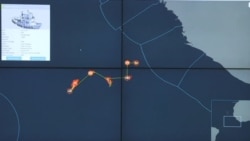Pew Charitable Trusts wants to end illegal fishing within a decade. The non-profit is working with the British company Satellite Applications Catapult to patrol the world’s oceans for marine poachers.
The oceans are huge and the problem is vast. Illegal fishing is a $23.5 billion a year crime, accounting for 20 percent of the global market or one out of every five fish caught. Piracy on the high seas hastens fishery decline, threatens food security, depletes economic resources and harms the environment.
Multiple data sources narrow the search for illegal fishing
Tony Long directs the Ending Illegal Fishing program for Pew, which has just launched Project Eyes on the Seas. Introducing it to reporters in the Virtual Watch Room on the Harwell science and technology campus in England, he stood in front of large scale 3-D rotating images of a globe, to explain how it works.
“[The planet] looks different from what you might expect because this globe only shows you the vessels that are coming into this system from a live Automated Information System or AIS,” Long said.
The display shows 120,000 blinking white lights, each a fishing vessel equipped with AIS. While the device is mandatory, illegal operators often switch it off and no one is the wiser. Long says to combat that, Project Eyes on the Seas combines multiple sources of satellite tracking data with secret government information and documentation on every ship’s history.
“The same system the fishing vessels use to predict where the fish are going to be, we can bring that environmental source into this data and now you begin to narrow down this vast ocean space and understand exactly where the fishing vessels are operating,” he said.
Making informed decisions
What emerges in this virtual watch room is real-time data that port officials can use to make informed decisions.
“What I’d like to achieve," Long explained, "is effectively a stop-go light; a red, green or yellow light that any official, anywhere in the world, can have a clear idea of the vessel entering their port, whether they should inspect it, whether they should let it come in and trade or whether they should just turn it away, which is one of the actions they can take.”
Sharing that data is what will make the system work, he says. A prototype for mobile devices is being developed.
Eyes on Palau's Marine Sanctuary
Among the project’s early adopters is the Pacific Island nation of Palau. The country has one of the richest fishing grounds in the world, one that it wants to protect. Last year, the Palau government announced a plan to ban commercial fishing in what would become a 630,000-square-kilometer marine sanctuary.
K.B. Sakuma, a special adviser to Palau's president, says Palau must address the recent increase in illegal, unregulated and unreported fishing.
“It’s come to a head in the last year or two, where [from] our southern island in the evening you can see on the horizon just dotted lights of these illegal fishermen that come into our waters, fill their holds with our fish, our resources, our food security, and go and sell it to the black market in Asia or somewhere else.”
Sakuma hopes acting on the data will reduce fishing piracy.
In its initial roll-out, Project Eyes on the Seas is also monitoring waters surrounding Easter Island in Chile.
Pew’s Tony Long says the project is expanding its reach to support global fisheries and marine sanctuaries. Retail operators are also interested in the system to guarantee that their product is gathered sustainably and legally.













